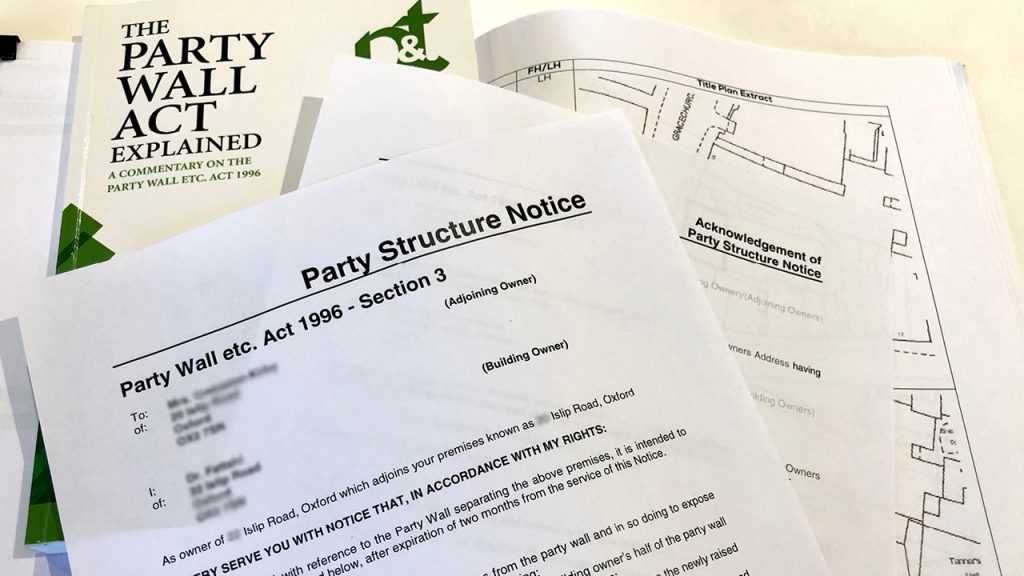The recent County Court case of Ormiston-Kirby versus Fattahi illustrates the potentially dire consequences that the Building Owner can face if he fails to serve proper notice under the Act.
In this case, the Adjoining Owner secured a mandatory injunction requiring the Building Owner to take down his unlawful loft extension and to pay damages in respect of the cost of remedial works, trespass and the stress and inconvenience associated with the dispute.
Dr. Fattahi is the Building Owner of a property on Islip Road, Oxford. Mrs Ormiston-Kirby owns an adjoining property.
In January 2015 the Building Owner contracted with a builder to construct an additional loft extension, the builder having previously completed an earlier loft extension at the same property. As a result of the previous work, the Building Owner pleaded that he trusted the builder and as such did not bother to read the various terms & conditions sent to him in relation to the proposed works.
One of those terms concerned the liability for obtaining consent from neighbours, making specific reference to the provisions of the Party Wall etc Act 1996. The Building Owner pleaded that he was unaware of his obligations under the party wall legislation, despite having received a subsequent reminder from his builder later in the process.
The Adjoining Owner’s property was let to a tenant and so the Adjoining Owner was not aware of the site activity until they visited the property and saw that scaffolding had been erected and that works were underway. The Adjoining Owner immediately raised the matter with the Building Owner and requested that works ceased and that party wall surveyors were appointed to deal with the matters arising under the Act. The Building Owner refused to engage the Act and so the Adjoining Owner sought to restrain the Building Owner from continuing their works. Work stopped, and solicitors were instructed.
The Adjoining Owner claimed that the new extension caused a nuisance by affecting the performance of a gas flue serving a Rayburn heating and hot water appliance installed within her kitchen. The proximity of the new extension to the flue meant that it was no longer safe to operate the Rayburn appliance.
In addition, the builder had caused damage to a number of roof slates when erecting the scaffolding.
Further losses were claimed in respect of loss of rent, additional mortgage payments, additional moving costs and other losses resulting from the Adjoining Owner being unable to sell the property whilst the dispute was ongoing (which was pleaded as her original intention).
Finally, general damages were claimed in respect of trespass, stress and inconvenience.
The Court awarded in the Claimant Adjoining Owner’s favour on the basis that the Building Owner’s plead of ignorance was not a satisfactory defence and that the Building Owner was not able to delegate his responsibility for obtaining consents from the neighbours to his builder. Costs were also awarded against the Defendant.
Damages were not felt an appropriate remedy, as to allow the extension to remain would deny the Adjoining Owner a voice under the statutory regime, endorse the Building Owner’s ignorance and failure to serve proper notice and allow the nuisance associated with the gas appliance to continue. Accordingly, a mandatory injunction requiring the removal of the unlawful extension was granted. The Court noted that there would be nothing preventing the Building Owner from correctly serving notice and engaging the Act at a later date in order to re-do and complete his works.
It is apparent from the Judgement that HHJ Vincent felt that the Building Owner’s case was not well made out; being poorly pleaded and lacking in reference to the applicable law. The Judge was often puzzled by both the content and conduct of the defence. This aspect reminds us that, if litigation is inevitable, good representation is essential. David Nicholls of Landmark Chambers acted for the successful Claimant.
This case serves as a welcome reminder to Building Owners that proper service of notice and compliance with the statutory regime under the Party Wall etc. Act 1996 is not optional. It follows the principles established in Roadrunner Properties Ltd vs Dean and another whereby the Court takes a dim view of those that do not comply; whether deliberately or through ignorance.
GIA advise both Building Owners and Adjoining Owners in equal capacity. We can assist by reviewing proposals and advising on the extent to which the Act applies before securing the necessary consents / Awards for a Building Owner or protecting the interests of an affected Adjoining Owner.
For more information or to discuss our services please contact aaron.morris@gia.uk.com


